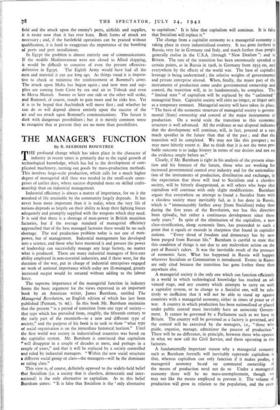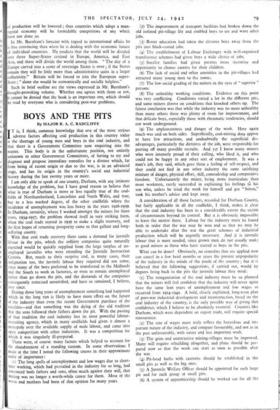THE MANAGER'S FUNCTION
By B. SEEBOHM ROWNTREE
THE profound change which has taken place in the character of industry in recent times is primarily due to the rapid growth of technological knowledge, which has led to the development of com- plicated machinery, turning out goods by mass-production methods. This involves large-scale production, which calls for a much higher degree of managerial skill than was needed in the small-scale enter- prises of earlier days, where success depended more on skilled crafts- manship than on industrial management.
Industrial efficiency is always a matter of importance, for on it the standard of life attainable by the community largely depends. It has never been more important than it is today, when the very life of nations depends so largely on their ability to keep their fighting forces adequately and promptly supplied with the weapons which they need. It is said that there is a shortage of man-power in British munition factories, but if the average standard of managerial efficiency approached that of the best managed factories there would be no such shortage. The real production problem today is not one of man- power, but of management. Industrial management has developed into a science, and those who have mastered it and possess the power of leadership can successfully manage any large factory, no matter what is produced. There are many industrial managers of first-rate ability employed in non-essential industries, and if these were, for the duration of the war, put in charge of industrial enterprises engaged on work of national importance which today are ill-managed, greatly increased output would be secured without adding to the labour force.
The supreme importance of the managerial function in industry forms the basic argument for the views expressed in an important book by an American writer, James Burnham, entitled The Managerial Revolution, an English edition of which has just been published (Putnam, 7s. 6d.). In this book Mr. Burnham maintains that the present " is a period of transition from one type of society— that type which has prevailed from, roughly, the fifteenth century to the early part of the twentieth—to a new and different type of society," and the purpose of his book is to seek to show " what type of social organisation is on the immediate historical horizon." Until the first world war society in industrialised countries was based on the capitalist system. Mr. Burnham is convinced that capitalism
will disappear in a couple of decades at most, and perhaps in a couple of years," and that it will be replaced by a society controlled and ruled by industrial managers. " Within the new social structure a different social group or class—the managers—will be the dominant or ruling class."
This view is, of course, definitely opposed to the widely-held belief that Socialism (i.e. a society that is classless, democratic and inter- national) is the only alternative to capitalism. As to this belief Burnham states: " It is false that Socialism is the ' only alternative
to capitalism.' It is false that capitalism will continue. It is false that Socialism will replace it."
The change from a capitalist economy to a managerial economy is taking place in every industrialised country. It has gone farthest in Russia, very far in Germany and Italy, and much farther than people
generally realise in the U.S.A. (through "New Dealism ") and in Britain. The rate of the transition has been enormously speeded at
certain points, as in Russia in 1918, in Germany from 7933 on, and everywhere by the effects of the world war. The base of capitalist leverage is being undermined ; the relative weights of governmental and private enterprise altered. When, finally, the major part of the instruments of production come under governmental ownership and control, the transition will, in its fundamentals, be complete. The " limited state " of capitalism will be replaced by the " unlimited " managerial State. Capitalist society will exist no longer, or linger only as a temporary remnant. Managerial society will have taken its place. " The basis of the economic structure of managerial society is govern- mental (State) ownership and control of the major instruments of production. On a world scale the transition to this economic structure is well advanced. All the evidence at our disposal indicates that the development will continue, will, in fact, proceed at a rate much speedier in the future than that of the past ; and that the transition will be completed. We may not like this prospect ; we may most bitterly resent it. But to think that it is not the most pro- bable outcome is to judge history in terms of our desires and not on the evidence amply before us."
Clearly, if Mr. Burnham is right in his analysis of the present situa- tion and his forecast of the future, those who are working for increased governmental control over industry and for the nationalisa- tion of the instruments of production, distribution and exchange, in the expectation that these will lead to Socialism and a classless society, will be bitterly disappointed, as will others who hope that capitalism will continue with only slight modifications. Burnham argues that everywhere an attempt to found a Socialist State with a classless, society must inevitably fail, as it has done in Russia, which is " immeasurably farther away [from Socialism] today than during the first years of the Revolution, nor has this direction been episodic, but rather a continuous development since those early years." In spite of the elimination of the capitalists, a new class-stratification, along economic lines, has proceeded to such a point that it equals or exceeds in sharpness that found in capitalist nations. "Every shred of freedom and democracy has by now been purged from Russian life." Burnham is careful to state that this condition of things is not due to any malevolent action on the part of Russia's rulers. It was the inevitable result of the pressure of economic facts. What has happened in Russia will happen wherever Socialism or Communism is introduced. Events in Russia are only cited because the transition has gone farther there than anywhere else.
A managerial society is the only one which can function efficiently in a world in which technological knowledge has reached an ad- vanced stage, and any country which attempts to carry on with a capitalist system, or to change to a Socialist one, will be rela- tively so inefficient that it will not be able to stand up against countries with a managerial economy, either in times of peace or of war. A country in which production has been nationalised or placed under public control must inevitably have an autocratic Govern- ment. It cannot be governed by a Parliament such as we have in Britain. The country will be governed as a factory is governed, and the control will be exercised by the managers, i.e., " those who guide, organise, manage, administer the process of production." There will be no difference, in principle, between those who operate in what we now call the Civil Service, and those operating in the factories.
A fundamentally important reason why a managerial economy such as Burnham foretells will inevitably supersede capitalism is that, whereas capitalism can only function if it makes profits, a managerial economy based on communal ownership of the means of production need not do so. Under a managerial economy there will be no mass-unemployment, though we may not like the means employed to prevent it. The volume of production will grow in relation to the population, and the costs
If production will be lowered ; thus countries which adopt a man- agerial economy will be formidable competitors of any which
i ave not done so.
In Mr. Burnham's forecast with regard to international affairs he is less convincing than when he is dealing with the economic future
individual countries. Hz predicts that the world will be divided into three Super-States centred in Europe, America, and East
sia, and these will divide the world among them. " The day of a u ope carved into a score of sovereign States is over ; if the States remain they will be little more than administrative units in a larger collectivity." Britain will be forced to join the European super- State ; " alone she would be economically and socially helpless."
Such in brief outline are the views expressed in Mr. Burnham's ought-provoking volume. Whether one agrees with them or not, t cannot be denied that the book is an important on; which should .e read by everyone who is considering post-war problems.



























 Previous page
Previous page